- Home
- Susanna Kearsley
Every Secret Thing Page 2
Every Secret Thing Read online
Page 2
The sisterly advising look was back. ‘Now, Kate, I thought that wasn’t serious. I’ve told you my opinion of your Mr Damien-Pryce.’
‘It isn’t and you have,’ I said. ‘Repeatedly.’
‘Then why…?’
‘The party,’ I informed her, ‘is for Patrick’s Aunt Venetia.’
‘Ah.’ She nodded understanding then, and even smiled approval. ‘Sorry. My misunderstanding. I thought you’d gone off the rails, for a moment. But I’ll permit you to see Patrick if you’re using him to meet Venetia Radburn.’
That had, actually, been my main objective since I’d first run into Patrick Damien-Pryce last week at the Old Bailey, or, more properly, since he’d run into me, so deliberately by chance that I’d suspected from the outset chance had not had much to do with it.
To be honest, I’d grown weary of his obvious pursuit. Some women would have found it flattering, I knew. The man was gorgeous. And intelligent. And witty. And urbane, in a way that few men were these days – at least, men under fifty. His clothes always fit to perfection; he knew the right places to go, and the people who worked there knew him, and I was beginning to think he could walk through a windstorm without it disturbing his hair.
‘Rising young star in the criminal courts,’ was how Margot had summarised him, when I’d asked. ‘Took silk at an early age; has the right pedigree. Very ambitious. His being a lawyer is only a prelude to politics, I should think.’
Politics would suit him. He was slick – that was the only word that fit him – and I’d never trusted men like that.
I would have tried much harder to discourage him, if Margot hadn’t also said that Patrick was related to Venetia Radburn, grand old dame of British politics, who even in retirement was regularly entertained by heads of state when travelling.
I’d have given a lot to be introduced to the woman, so the prospect of spending the whole of Friday evening eating dinner with her in return for letting myself be chased round the table a few times by her good-looking great-nephew seemed – to me, at least – to be a bargain.
‘Just mind you keep your wits about you,’ Margot told me now, her voice not managing to hide her amusement. ‘People like the Damien-Pryces are bound to have a pile in the country’ – which was British-speak, I knew, for ‘giant house’ – ‘and I’ve seen first-hand how property affects you. You go all wobbly,’ she accused me, ‘in great houses.’
‘I do not.’
‘You do. I was with you at Blenheim, remember? Last year.’
‘That’s different. Blenheim is a palace.’
‘I’m only saying. Certain settings,’ she informed me, ‘seem to make you lose your proper sense of judgement.’
A male voice above my shoulder asked, ‘Which settings would those be, then?’ and Patrick himself, pint in hand, slid confidently into the booth beside me, his long body as always looking too cramped in the small space.
‘Sorry, that’s classified,’ I said, immune to the strength of his smile.
Margot, less welcoming, told him he looked out of sorts.
‘Yes, well, I was late to court this morning. The police had traffic stopped in Cannon Street, for some inestimable reason…’
I said, ‘There was an accident. A hit-and-run. A man was killed.’
‘Kate was there,’ Margot said; then, dryly, ‘She’s been traumatised. That’s why I’ve got her drinking.’
‘Ah.’ He glanced at my wineglass. It wasn’t like me to drink wine at this time of the day, but I didn’t imagine that Patrick had noticed. Men like Patrick didn’t notice things like that unless they somehow stood to benefit. ‘So you were an actual witness?’
‘Some witness.’ I sobered. ‘I wasn’t any help to the police. I couldn’t really tell them anything. Couldn’t even give them a description of the car. It didn’t stop,’ I said again, as I’d said earlier to Margot.
And again she told me, ‘Kate, it was an accident. There wasn’t anything you could have done.’ Above her drink, she said to Patrick, ‘You might tell her she needn’t take it all so much to heart. I mean, he might have known her grandmother, but still, that doesn’t mean—’
‘He knew your grandmother?’ asked Patrick.
‘Look,’ I told them both, ‘I’d really rather not discuss it. Can we change the subject, please?’
There was a pause, and then, ‘So,’ Margot said to Patrick, ‘Kate tells me you’re taking her down into Kent at the weekend.’
‘I am.’
‘Your Aunt Venetia’s birthday, is it? How old would she be, now?’
‘No one knows,’ he said. ‘I should think she’d be close to the Colonel’s age, maybe mid-eighties, but you’ll never make her admit to that.’
The Colonel, I knew, was his father. Why Patrick called him the Colonel and not Father was a thing I wasn’t sure of. It might have been a nickname of affection, or a sign of emotional distance between the two men – I hadn’t been able to figure out which from the few times that Patrick had mentioned his family. I had, though, been able to glean that his father was considerably older than his mother, and that somewhere – on his mother’s side, I thought – there was a fair amount of money.
He turned to me. ‘You’ve got the map I gave you, right? You won’t get lost?’
‘I won’t get lost.’
‘Because if you’re worried at all about finding your way you could drive down with me. Take the train back.’
He just never gave up, I thought. Ten to one I’d get down there and find there were no trains back up to London. Amused, I told him, ‘That’s all right. I’d rather have the car. What time is dinner?’
‘Eight. But you should aim to get there earlier, to spend a bit of time. I ought to be there myself around six, give or take. We could go for a walk round the gardens…you know, feed the ducks, that sort of thing.’
‘They have ducks?’ Margot asked.
‘And a handful of swans.’
‘It sounds lovely,’ she said. Then, in casual tones, ‘Big place, is it?’
‘Big enough. It used to be a priory, in Tudor times, and everybody after that saw fit to add a piece. My mother complains there are too many bedrooms and not enough baths.’
Margot sent me a knowing look, meant to remind me of my alleged weakness for opulent houses. I chose to ignore her, and Patrick, being self-absorbed, missed the exchange altogether.
‘I can’t stop,’ he said, draining his pint. His breath smelt of ale as he leant in to kiss my cheek. ‘Want to do dinner tonight?’
‘Can’t.’
‘Tomorrow?’
‘I’m busy all day.’
‘Right, we’ll leave it till Friday, then.’
Watching him stand, I asked, ‘What should I wear?’
‘Wear whatever you like,’ he said. And then, halfway to the door, he turned back to call over his shoulder, ‘Oh, and don’t forget something to sleep in. I’m partial to black negligées,’ in carrying tones that turned heads in the pub, bringing all-knowing smirks to the eyes of the journalists sitting around us.
‘You want to watch out,’ Margot told me. ‘You’ll end up a headline yourself.’
She was teasing, of course. She couldn’t possibly have known just how prophetic those few words would end up being, in a very few days’ time.
I walked through Covent Garden on the way to my hotel. I did it every evening; but tonight, instead of turning at the market, I went straight on past the Opera House and crossed the narrow street to enter Broad Court, a brick-paved pedestrian passageway running from Bow Street to Drury Lane.
The Fielding Hotel was a small, charismatic place, halfway along the short stretch of Broad Court. An old building, with vines on the front and a dimly cramped entry that gave, on the right, to a cosy front bar, and on the left, to a hole-in-the-wall type reception desk. Everything smelt vaguely dusty, and charming. An African grey parrot, caged near the door of the bar, eyed me warily as I stepped in to the entryway.
The desk clerk, a well-dre
ssed young woman, became wary, too, when I said that I worked for a newspaper. It was always a gamble, I knew, introducing myself as a journalist – some people talked, others didn’t. This woman seemed far more concerned with protecting a hotel guest’s privacy. Admirable, really, if not very helpful to me.
‘Mr Deacon,’ she said, ‘was a regular guest, yes. We’ll miss him.’
‘Did he stay here often?’
‘Whenever he was in London.’
A diplomat’s answer, I thought. I pressed forward. ‘Was he here alone?’
‘Yes.’ A little indignant.
‘I just meant…I wondered if there was a friend, or maybe someone from his family, staying with him.’
‘No.’
‘Did he have a family?’
‘I don’t know.’ She didn’t know much, as it happened, or else she simply didn’t want to say. Even when I showed her the card Andrew Deacon had given me, she wouldn’t confirm or deny the home address by checking the register. ‘Sorry,’ she said, ‘but guest records are private.’
Aware that I’d run up against a wall, I gave up trying. Thanked her. Turned. Then, struck by one last thought, turned back.
‘What sort of man was he?’
‘Sorry?’ she asked.
‘I mean, did you like him?’
That question she answered. ‘We all did. He was sweet. He always stopped to say good morning; always saved a bit of breakfast toast with jam for Smokey,’ she said, pointing to the parrot. ‘We all liked him very much.’
I said, ‘I see.’ And then, although there seemed no point in it, I handed her my card. ‘In case you think of something else…’
She read my name. ‘You’re Katherine Murray?’
There was something in her tone that gave me hope. ‘Yes. Why?’
‘You’re staying at the Cheshire Arms?’
‘Yes.’
‘I’ve been ringing you all afternoon,’ she said, relaxing. ‘I am sorry. If I’d known that you were you…’ Her eyes met mine, companionable. ‘We found a note,’ she told me, ‘in his room, when we were cleaning it. Your name; the name of your hotel. He had today’s date written underneath. We thought perhaps he had made plans to meet with you today…that you might not have heard…that you might want to know.’
It surprised me that he’d known the name of my hotel, but I tried not to show it. ‘Thank you. That was very thoughtful.’
‘But you knew.’
‘I did, yes. I was…I was with him, when it happened.’
‘Oh, I see.’ The desk clerk eyed me a long moment, and then asked a question in her turn: ‘He didn’t suffer, did he?’
Her face remained impassively professional, but her eyes told me my answer was important.
‘No, it was very quick. I’m sure he didn’t suffer.’
‘Good.’ And bending to her work, she said again, as though it were his epitaph, ‘We all liked Mr Deacon.’
There was an old man eating on his own, two tables over in the dining room of my hotel. I found that my attention, all through supper, travelled back to him, because of that – because he was an old man, quiet, someone I might easily have overlooked. And because it had occurred to me that Andrew Deacon could have sat there last night, or the night before, and I might not have noticed him, either.
I could, for all I knew, have met him, spoken to him somewhere…at a dinner function – I had been to two since I’d arrived here – or a party, or the library. Perhaps our paths had crossed, and I had simply not remembered.
I was good with names and faces, when it suited me. I noticed people like Venetia Radburn, people who were newsworthy – but with ordinary people of a certain age, my vision seemed to narrow.
That bothered me more than it should have, perhaps. No one likes facing up to their shortcomings, me least of all, and I didn’t like admitting I was something of an ageist.
Old people were invisible to me, I thought, unless they were of use to me.
The waiter broke my train of thought by reaching past my shoulder to retrieve my empty plate, and looking up to thank him I observed with vague surprise that I was now the only person in this section of the dining room. The old man who’d been sitting at the second table over had now gone, his place already cleared and set for the next person, as though no one had been there.
I’d told the truth to Margot when I’d said my Grandma Murray didn’t part with information. It was something of a joke among my co-workers, who knew by now it was a waste of time to ask her anything. ‘She always comes back with this “need to know” argument,’ one of my friends had once told me. ‘It’s like phoning the Pentagon.’
Grandma’s defence was that if I had wanted somebody to know something – how old I was, or what flight I was on – I’d have told them. She kept her own life just as private.
So I couldn’t believe she’d have told anybody the name of my hotel in London. Not even an old friend…assuming, of course, Andrew Deacon had been an old friend.
There was only one way that I knew to find out.
It was nearly eleven o’clock when I settled myself on the bed in my room. In Toronto right now it would only be suppertime. Grandma would be in the kitchen, I thought, only steps from the phone. I was right. She picked up on the second ring, her voice as sure as ever. ‘Hello?’
That voice turned me into a child, as it always did; took me straight back to the clean-smelling rooms of the old brick house on Barton Ave., to the little back room with its rose-patterned wallpaper where I had slept as a child, and where I would sleep when I went home next Tuesday.
I’d never known my other grandmother – she’d died young, as my own mother had – and although both my grandfathers had lived to see my birth, the only one that I had any memory of was Grandpa Murray, who, together with my grandmother, had raised me while my father had gone off to do his corporate work in India, the Middle East, South Africa, wherever he was sent.
Grandpa Murray I remembered as a gentle man, a tall man with a presence that was comforting. He smoked a pipe, and often took me walking in the neighbourhood. He knew the ways to whistle like a bird and even once, to my amazement, coaxed a squirrel from its tree to take a walnut from his hand. But these were childhood memories only. He had died when I was ten. And five years after that, my father, in Bahrain, had had his third and final heart attack. Since then, the only family that I’d had was, ‘Grandma,’ I said. ‘Hi. How are you?’
‘Katie! Nice to hear your voice. They were just talking about your trial, on the evening news. You’re finished, then, are you?’
‘Nearly. I have a few follow-up interviews, still, with the families…’
‘I’m sure the guilty verdict will have come as a relief to them. They’ve had to wait so long,’ she said, ‘for justice.’
‘Yes.’ I hesitated. ‘Grandma…’
‘It’s a shame that no one stopped him sooner. I’d imagine the police would have made more of an effort to catch him if he had been killing young women instead of old men.’
She was probably right, I thought. ‘Grandma…’
‘Yes, Katie?’
‘I was wondering,’ I started off, then stopped and simply said, straight out, ‘I met someone today who said he knew you.’
‘Really? There in London? Who was that?’
‘A man named Andrew Deacon.’
She was silent for so long that for a minute I thought our connection might have been broken…until I heard the quiet creaking of the chair springs as she sat. Her voice was different. ‘Deacon?’
‘Yes. He said to say hello to you. He asked me how you were.’ Feeling as though I had stepped onto less than firm footing, I edged my way forward with caution. ‘I kind of wondered, Grandma…that is, he just seemed to know so much about me – who I was, and what I did – I wondered if you’d maybe been talking to him recently, and had mentioned that I was in London, because—’
‘No,’ her voice drifted in, not as strong as before, as though p
art of her had moved a long way off. ‘I haven’t talked to Deacon now for many years,’ she said. ‘Not since…’ The words trailed off. Another pause. And then, ‘How is he?’
‘Actually, Grandma,’ I said, as I worked one finger through the coiled ringlet of the telephone cord, wishing that I could delay the inevitable, ‘actually, he…that is, there was an accident this morning, just after he and I spoke, and I’m afraid…’ I stopped, and tried again. ‘It was a hit-and-run, you see. A car came out of nowhere, and it hit him, and he’s…well, he’s dead.’
She took a moment to absorb this. ‘Dead?’
‘I’m sorry. Yes.’
The silence stretched so long this time I had to finally speak to reassure myself I hadn’t killed her, too, from shock. ‘Grandma?’
She took a breath that shook a bit. And then she did a thing she’d never done. She said, ‘Forgive me, Katie,’ very softly, and she set down the receiver.
THURSDAY, SEPTEMBER 14
‘Were they lovers, do you think?’
‘Oh, Margot, please. My Grandma Murray?’
We were having what would likely be our final meal together for this time of mine in London. I’d come out by train to Margot’s flat, in Shepherd’s Bush, for supper. You had to be a very good friend of Margot’s to get an invitation to her flat. Like my grandmother, she had a thing for privacy.
Her flat was in the lower level of a house, its narrow rooms as cosy as a hug, the walls and bookcases and tables overflowing with the evidence of years of travel – wooden carvings from all over, from the Orient, and Africa; clay figurines from Mexico, a painted mask from Hong Kong, and a weaving from Afghanistan.
Her cooking, too, was wonderfully eclectic. I never knew what recipes, collected in the course of her assignments, she was going to try out on me, and every time I sat here, at her tiny kitchen table, with the butcher block beside me on the counter, heaped with peelings, I could not suppress a feeling of adventure.
She reminded me, ‘Well, you did say your grandmother’s reaction was completely out of character, her ringing off like that. The thing is,’ she went on, grating raw ginger into a pot of mystery vegetables, ‘you never know what old people got up to, in their youth. Take my father, for instance. When he was my age he was quite the adventurer. He climbed mountains, raced cars, has the pictures to prove it. But look at him now and you’d think he’d done nothing but sit and play bridge all his life. Maybe your grandma’s like that – a dark horse.’

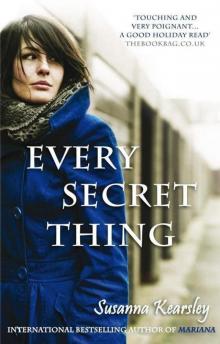 Every Secret Thing
Every Secret Thing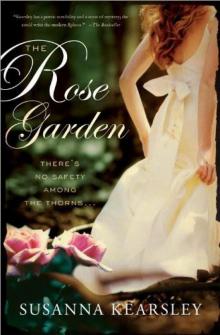 The Rose Garden
The Rose Garden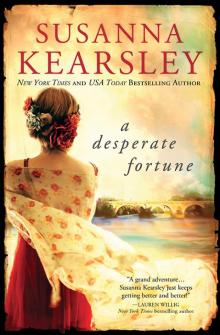 A Desperate Fortune
A Desperate Fortune The Winter Sea
The Winter Sea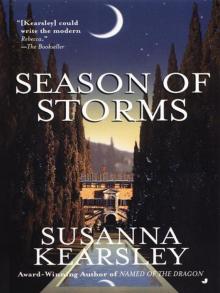 Season of Storms
Season of Storms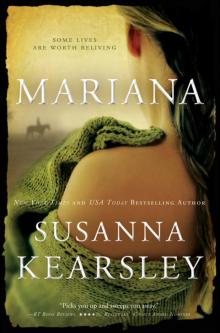 Mariana
Mariana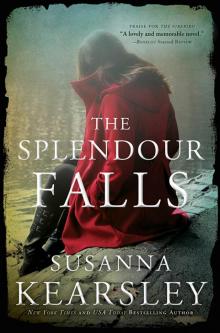 The Splendour Falls
The Splendour Falls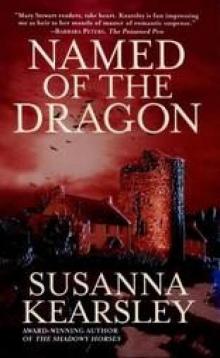 Named of the Dragon
Named of the Dragon Sophia's Secret
Sophia's Secret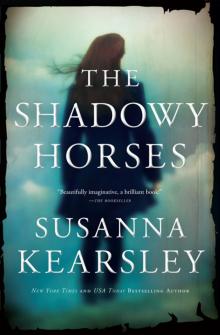 The Shadowy Horses
The Shadowy Horses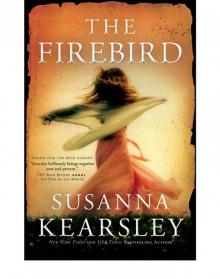 The Firebird
The Firebird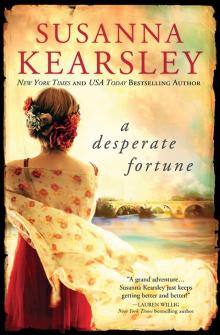 Desperate Fortune
Desperate Fortune